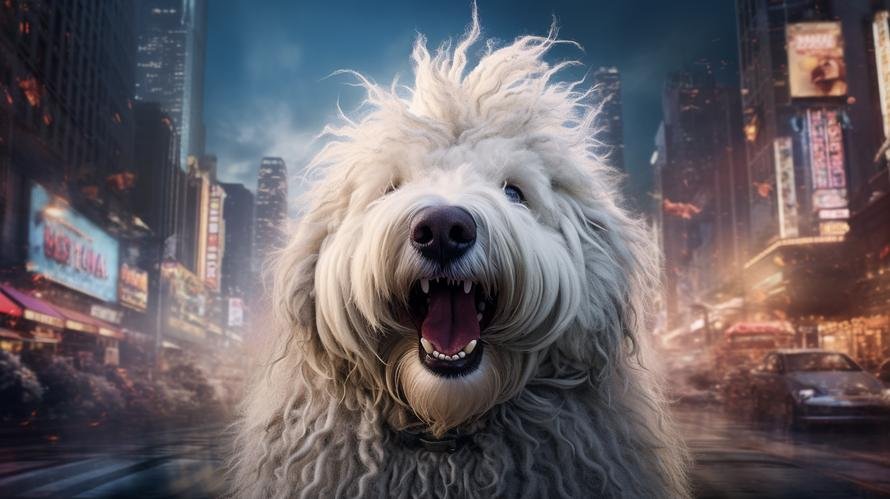Imagine owning a living, breathing mop that can play fetch. Well, if you happen to have a Komondor, that’s almost what you’ve got! These majestic creatures, with their corded coats, are a sight to behold, and their dietary needs are as unique as their appearance.
The Komondor, a Hungarian breed known for its distinctive white cords, is not your average dog, and it requires more than average knowledge when it comes to nutrition. Their fluffy coats may be what draws you in, but it’s the careful balance of their diet that will keep these gentle giants healthy and happy.
First off, let’s debunk a common myth: their size does not mean they can eat just anything. Despite being a large breed, Komondors have dietary requirements that can’t be ignored. They thrive on a diet that supports their size and activity level while maintaining a healthy coat and skin beneath all of that hair.
When thinking of the best food for your Komondor, you should be looking for high-quality, protein-rich foods. Meat should be the main ingredient. Poultry, beef, lamb, or fish—all of these sources provide the amino acids necessary for muscle development and energy.
However, more protein isn’t always better. It’s the quality that matters. Whole meats or meat meals (a concentrated form of meat where the moisture is removed) are fantastic options. Avoid meat by-products, as these are lower in quality and can include non-muscular parts of the animal.
Next is fat. Yes, fats are friends, not foes when it comes to a Komondor’s diet. Essential fatty acids promote a shiny, healthy coat, which is a must with cords like they have. Look for foods that contain sources like flaxseed oil or fish oil.
But wait, fats and proteins aren’t the only things a Komondor munches on. A balanced diet includes carbohydrates. Rather than fillers like corn or wheat, savvy pet parents should seek wholesome grains like brown rice or even grain-free alternatives such as sweet potatoes. These not only provide energy but are also easier on your furry friend’s digestive system.
Now let’s talk about something that not only affects a Komondor’s internal health but can also impact those iconic cords: fiber. Fiber is important to maintain a healthy digestive system. It also keeps them fuller for longer, preventing overeating. Ingredients like beet pulp or chicory root are great sources of fiber that can do wonders for your dog’s digestion.
A Komondor’s diet should also contain a variety of fruits and vegetables. These aren’t just for show; they are packed with vitamins, minerals, and antioxidants. Think of them like nature’s multivitamin, providing nutrients that support a robust immune system and overall health.
As for the size of their meals, it’s not a one-size-fits-all situation. Portion size might vary based on the dog’s age, size, and activity level. Equally important is the frequency of feeding. For Komondors, it’s often advisable to split their daily intake into two meals to mitigate the risk of bloat – a life-threatening condition where the stomach twists after eating a large amount and partaking in vigorous exercise.
Hydration is another key element. Ensuring your Komondor has access to clean, fresh water at all times is critical. This aids digestion and helps maintain their body temperature, particularly under all that hair.
What about treats, you ask? Treats should be just that – occasional and not a regular part of their diet. When you do give treats, they should be healthy and, if possible, beneficial, like those that clean their teeth or have joint-supporting supplements for this large breed’s bones.
Don’t forget, as majestic as they appear, Komondors can be just as susceptible to food sensitivities and allergies as other dogs. Watch for signs of gastrointestinal upset or skin irritations, which could signal a problem with their food. If this occurs, consulting your veterinarian for testing and dietary adjustments is the best course of action.
What about puppies, though? Komondor pups have different dietary needs as they grow. Puppy food, specifically formulated for large breeds, will support their rapid growth and development, ensuring their bones and joints mature correctly and don’t become overburdened by their weight.
Finally, remember that diet is not just about the food you give your Komondor, but also about how you feed them. They might not be the fastest eater at the dog park, but it’s paramount for them to eat without a rush to avoid choking or digestive issues.
A Komondor’s diet is a balancing act—too much or too little of one thing can topple their health, disrupting that famous mop-like appearance. By ensuring their meals are packed with high-quality protein, just the right amount of fats and carbs, and plenty of vitamins and minerals, your Komondor can live a life as grand as their looks suggest.
In the kitchen or in the wild, the best food for a Komondor is one that caters to its needs without compromising on quality. Remember, you are what you eat, and that goes for your four-legged mop friend too. The care you put into their bowl is a testament to the love you share. Their quirky appearance draws smiles and wonder, so let’s ensure their diet draws health and vitality. Keep their bowls filled with goodness, and your home filled with the resounding bark of one happy, healthy Komondor.



